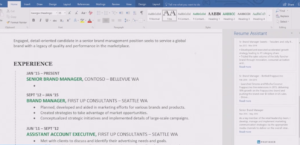I have to give credit where credit is due, and Aerotek is the one that originally discovered how long it takes to figure out you suck as a recruiter! It’s right around 9-14 months. The TA world is littered with people who have worked at Aerotek for 9-14 months! If you’ve spent 13 minutes in Talent Acquisition on either the corporate or agency side, you’ve seen a ton of these resumes.
Just having recruiting experience, especially IT or Technical, can guarantee you a recruiting career for at least ten years or more, even if you are completely awful at recruiting! As a President of a recruiting firm, and someone who has run corporate TA shops for years, I see these candidates come across my desk on a weekly basis:
A crappy Recruiter looks like this:
1. First Recruiting job right out of college, working for a big agency recruiting sweatshop and this position lasts 9-12 months. They left because “they didn’t agree with the management style” of said agency. The truth is they weren’t meeting their goals, but we give them a pass because these sweatshops churn and burn through people.
2. The next gig is usually another agency or small corporate recruitment gig. This one usually lasts under 9 months. It’s more of the same, they couldn’t do it the first time, what makes you think they’ll do it for you!?
3. Now, if they’re smart, they jumped from the second gig before getting fired to a very large corporate gig where they have so many recruiters they truly have no idea what they actually do, this will buy you at least 24 months before you’re discovered as a recruiting fraud. In these big organizations you don’t even recruit, just post and pray, anyway, so you should be able to survive.
4. Big organizations finally figured out you’re worthless, but you now know the game, so you leveraged this big corporate name on your resume into your next gig, this time as a senior recruiter, with another big firm who wants you to sell out your last firm and all their recruiting secret. The big secret is, you have no idea, and the last big org gig you had, well, they had no idea. Once you run out of fake secrets to share, you’ll be kicked to the curb, so start looking for a recruiting manager gig in about 18 months.
5. You jump at the first recruitment manager gig you’re offered. A mid-sized firm, who loves your big company experience and can’t wait for you to save them from themselves. They have super high expectations on what you’re going to do for them, this is not good for you, remember, you suck at recruiting! You’re gone in 9 months.
6. Welcome back to the agency world! You will now bounce around these companies for a while, selling the fact you have ‘contacts’ at big companies of which agency owners want to get into. You’re now 8-10 years into your Recruiting career, and you’re an awful, crappy recruiter.
If you’re truly lucky as a crappy recruiter you’ll fall into some recruiting gig with a college or university or some other sort of fake, non-profit. Those are like wastelands for crappy recruiters. Absolutely no expectations that you’ll do anything of value, just show up, collect a check and follow a process. It’s never your fault, and hey, they don’t want you to move to fast anyway!
Beware TA leaders. There’s a reason a recruiter has had 4 – 6+ jobs in ten years, and it’s not because they’re good at recruiting! The best recruiters don’t move around because they’re so valuable the organizations they work for won’t let them leave! If you’re crappy, people are hoping you leave and take your crappy recruiting skills to your competition!

